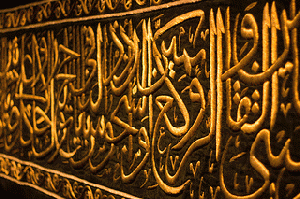Eric Walberg is a Canadian journalist who converted to Islam and has been covering the Middle East for a number of years. I do not know whether there are other books about Islam by converts, but this one is written by someone who is fiercely political and who sees Islam as a remedy to the world's ills.[tag]
Although Walberg does not say so explicitly, the notion of resistance to imperialism has been basic to Islam since the beginning of the Palestinian struggle against Great Britain in the nineteenth century. After the creation of Israel, Iran, Lebanon and Syria became known as 'frontline states' in that resistance (see my review of http://click here).
This is an ambitious book that may suffer from being at once an argument for Islam as the solution to the woes of the modern world and an analysis of the various aspects of Islamism as well as a history of Islamism's progress or lack thereof by country.
The fact that Islam is the fastest growing religion on the planet - growing faster, according to Time magazine, than the population - notwithstanding Islamophobia - suggests that its appeal is fundamentally different from that of other religions, and Walberg makes that point eloquently, quoting Egyptian Muslim Brotherhood member Essam el-Erian, on the Iranian revolution:
"Young people believe Islam is the solution to the ills in society after the failure of western democracy, socialism and communism to address the political and socio-economic difficulties." It prompted Saudi rebels to occupy the Kaaba that same year in an attempt to spark revolution, Syrian Muslims to rise against their secular dictator Hafez al-Assad in 1980 and future Al-Qaeda leader Aymin Zawahiri to conspire to assassinate Egyptian president Sadat in 1981."
And just as the US is credited with contributing to the rise of ISIS, according to Walberg "the imperialists had a strong influence on the development of political Islam during Great game II (empire against communism) encouraging Muslims opposed to theism/secularism and their nationality and/or socialist offshoots to resist leaders such as the Syrian and Iraqi Baathists and Egypt's Nasser. This resistance caught fire in the 1980s as Afghans were catalyzed to oppose the Soviet occupation""
In Part I Walberg sets out a theory of political Islam, first confronting "Political Spirituality and Jihad", then the "Sunni Failure in Egypt" with theoreticians Banna and Qut'b, and finally Shia Success in Iran.
Part II traces "The Expanding Parameters of Political Islam", reviewing the theory of violence against invaders as opposed to Bin Laden's violence in the Imperial Center, Zawahiri's violence against client Regimes, the legacy of Al-Qaeda, Terrorism before an after 9/11.
In "The Perils of Cooperation" Walberg reviews recent history in Saudi Arabia, Qatar, Pakistan and Turkey, four very different examples, turning then to "The Perils of Implementation", which includes a much longer list of countries that have flirted or invested in Islamic power.
Finally he considers the Return of the Caliphate, Color Revolutions and the Arab Spring, to conclude with the Twenty-First Century Umma's Striving for a New Modernity, Muslim, Christian-Jewish Understanding and Post-materialism.
There are two strands to political Islam, the first being exploitation:
Western economies for nearly 100 years have been sustained and built on cheap fossil fuel from the Middle East and Persian Gulf. While the vast majority of people in the Muslim world remain impoverished, their tiny ruling elites, sequestered into statelets, have enriched themselves by aligning with Western powers and allowing them to exploit the energy and mineral resources of Muslim lands.
Walberg notes that "traditional Muslim scholars, the ulama, were not much help. Confronted by invaders, and faced at home with movements which sought to emulate the West, including nationalists and secularists, they retreated, shutting down debate about how to extricate the Muslim world from the grip of empire."
In one of the most original insights of his books, Walberg writes:
The new economic order, embedded in the legal systems being fashioned by the occupiers, was resisted by both secularists and Islamists. Marx et al clarified the underlying problem: 'the law' in each land was being fashioned to meet the needs of the economic order, where all economic activity was condoned as long as it is carried out in conformity with 'the law'.
For Walberg:
it is this enforced ascendancy of economic power over the popular political will that makes political Islam necessary today, after the defeat of the communist resistance to capitalism. Nothing short of a 'new law' will do, where a code of ethics is embedded. The communist revolutions for the most part failed to achieve this and Islamists became the main force of resistance to imperialism by default.
With this notion Islamic Resistance to Imperialism rejoins the growing global movement known as post-modernism, which is both cultural and economic, a rejection of senseless materialism based on the notion that 'more stuff is better', and a realization that community is better than rampant individualism that leaves scope for a religion whose God demands above all that humans treat each other with ''respect, justice and dignity'.
(Note: You can view every article as one long page if you sign up as an Advocate Member, or higher).






